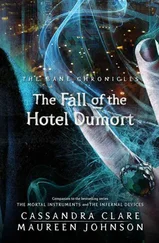Because she is not there, hearing innocently, because there is no Dumont, the mother/lover, the feminine at its most terrifying, there is little opportunity, in Room Service , for indecency. Room Service is a cleaned-up version of a Marx Bros. movie — the movie was not written by the Marx Bros. but was originally a Broadway play first produced in 1937.
The Marx Bros. worry about a visit from “the hotel dick.”
“Are you the hotel dick?” they ask everyone.
The hotel dick turns out, after all, to be the hotel doctor.
The doctor is repeatedly mistaken for the hotel dick, by different characters. That’s transference perhaps.
Everyone is expecting the hotel dick, but, like KM’s husband, he never comes.
II
Later in the movie, the Marx Bros. again cannot pay their bill. This time the hotel manager incarcerates them in the hotel until they can pay. The room they wanted to get into has become the room they want to get out of.
CHICO
Let’s let off the fire alarm!
GROUCHO
It ain’t a fire alarm without a fire.
HARPO gestures (Harpo, like Dora, has aphonia).
CHICO
(always Harpo’s interpreter)
Alrighta then let’s have a fire.
(Dora dreams there is a fire, and that her mother wants to save her jewelry box.)
HARPO (always the creeping id) necks a bottle of champagne, throws paper out of the waste bin and lights it with a flaming torch produced, suddenly, from his hat. He sits and warms his hands, and the fire, turned into something friendly, is impracticable.
WILDE
I’m glad to hear you smoke. A man should always have an occupation of some kind.
The Marx Bros. think again.
When they wanted to stay in the hotel, one of them had to pretend to be ill. Now that they want to leave the hotel, one of them has to pretend to be dead. Leo, they decide, must pretend to kill himself.
CHICO
He drinks a bottle of poison. We have to rush him to the hospital. They’ll have to let us through.
(Dora mentions suicide in a letter. She puts it away in a drawer; her father finds it nonetheless.)
The Marx Bros. put Leo into the bed in the bridal suite. It is a single bed, pink and chintzy. Leo’s LOVE INTEREST enters. She should be anguished, but she is undramatic, or perhaps she’s no actress.
LOVE INTEREST
(flatly)
Mr Gribble said you were dying.
(Dora saw Herr K walking down the street. He was knocked over by a car. She didn’t show immediate distress; she didn’t stick around to see what happened.)
LEO
(who is a playwright)
It’s only a plot darling.
(That might have been parapraxis I mean a joke.)
LEO
(pretends to be dead)
CHICO
All he said was, “Mother!”
WILDE
(in that comedy of the mystery of maternity, The Importance of Being Earnest)
Mother!
HOTEL INSPECTOR
You struggle for money. What good is it. You never know who’s next. Too bad he didn’t die at the Aster.
CHICO, GROUCHO (HARPO) sing “Swing Low, Sweet Chariot, Coming For To Carry Me Home” and take Leo out of the hotel and into the theater. The hotel’s exit is around the back. It is small, an emergency exit, for things that should not be taken through the hotel entrance, which we never see. Leaving the hotel is more difficult than it seems.
They arrive in the theater or, rather, they are already there. We don’t see how they get in, but they had no need to leave the hotel. Leo’s play takes place (as in a dream) in a theater that appears on the premises. The play that is staged in the luxury hotel is about miners. The actors enter carrying shovels, to show their trade.
WILDE
I am glad to say that I have never seen a spade!
The play appears to be a serious play, a play about social issues, about hard work, and also about death (it is a tragedy); it is about things that cannot be given house room in the hotel. The play takes place in the country. There are no hotels there. It is a play about people who cannot afford to stay in hotels, or to go to the theater. When the actors call each other “comrade,” everyone applauds (it is 1938).
Hidden in the audience, Leo gives himself away by calling “Author! Author!” He calls for himself in the third person, as he is dead. HARPO appears on stage playing dead, on a bier. Though his appearance must have been unexpected, none of the actors seems surprised. Harpo wears a lumberjack shirt, which fits the action of the play. No one is sad. This is because he is only acting. But the actors have stopped acting (if they were still acting, they’d act sad). Or maybe the play has changed from a tragedy to a comedy.
Death, like Wilde’s hotel, is beyond my means. A hotel is nowhere to end up, not really. Tragedy is impossible there. Death in a hotel — what a joke! Wilde was right. In a hotel, death is deflected as it is by a joke, where meaning is never allowed to dwell for long. It blocks any hope of ending. But I might like to die in a hotel, clinically, on clean sheets, to make a clean sweep onto a tabula rasa, like being born. Famous last words?
ALL
(singing, onstage and off)
Swing low, sweet chariot, coming for to carry me home.
“The capacity of lacerating accusation to indwell may be such that while its target is fearful that it may be true, she’s also fearful that it may not be true, which would force the abandonment of her whole story.”
— DENISE RILEY, LANGUAGE AS AFFECT
Cast:
Freud:
a psychoanalyst
Dora:
a teenage girl
KM:
a guest
I
So I wrote my hotel reviews, and I was not paid, but I exchanged words for things, the sort of things you find in hotels. The exchange rate was not set, but the exchange always happened. My words enacted off the page, and some kind of transference occurred, or rather, my words pre-acted, as I often knew what was required of my writing before I’d stayed. It was a matter of formula. My words were turned into white beds, and white baths, and towelling robes, and dinners, none of which I could hold onto, none of which I wanted to. In the end the things were more transient than the words, in that they stopped, and the words are still there.
Katherine Mansfield wrote a story in which the daughter of Baroness von Gall came to the German Pension to take the cure. She was dumb. She was there, perhaps, for a talking cure. The guests could not tell, because the baroness’s daughter could not tell them. She also could not tell them that her companion, whom they so fêted, was not the baroness’s unwed sister, but her maid.
Aphonia is only interesting in the unmarried. So is talking.
KM
Love which becomes engaged and married is a purely affirmative affair.
I have been (or possibly am still) married and I claim the right to words. But what can I say? I can tell and tell and talking does not change anything, not even in me.
I am in my hotel, and you are not there. I thought the hotel would be an escape from you but instead your absence fills it, though, in the hotel, there is nothing of you. I don’t want to talk to you anyway. I can’t get on with you. I can’t get on without talking to you. If we talk to each other we will say nothing. You like to talk to me about things, about things I mean, like beds, and baths, and towelling robes, and dinners. You like to talk to me only if nothing is said.
The screen fills the screen, waiting for the talking to begin.
(The talking that is, of course, writing.)
It does not, so it is never disappointing.
I only want to talk to you when I am not talking to you.
Читать дальше












